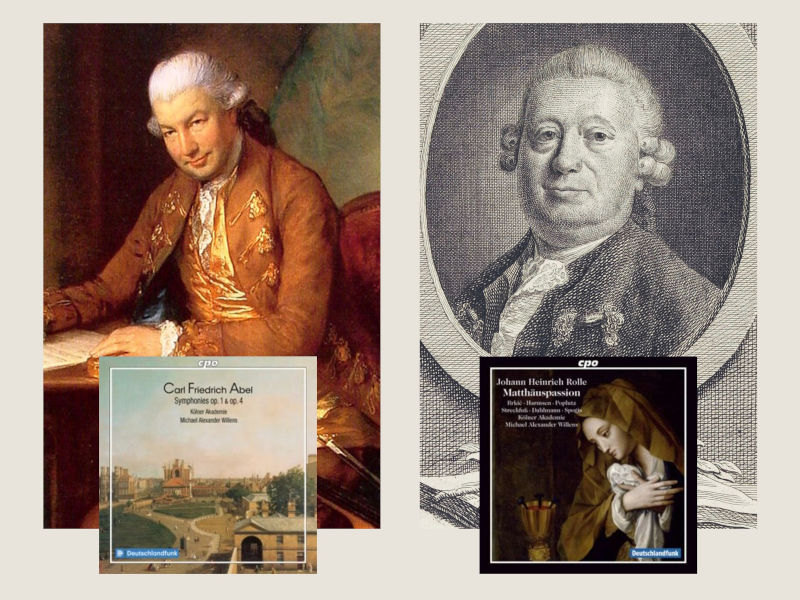New recording released with Alon Sariel
Vienna Mandolin Stories is Alon Sariel’s first full concerto album, inviting listeners on a journey through

We will be celebrating two birthdays in the coming days – on 22 December, Carl Friedrich Abel will be celebrating his 299th birthday, and the next day, Johann Heinrich Rolle will be celebrating his 306th birthday.
Carl Friedrich Abel was born into music: His father, the viol virtuoso Christian Ferdinand Abel, in whose footsteps he followed, was a musician in Bach’s court orchestra in Köthen. None other than Bach himself arranged for the young Abel to work as a chamber musician at the Polish court in Dresden. As a result of the Seven Years’ War, Abel had to leave Dresden and eventually made his way to London, where he quickly attracted attention and became chamber musician to Queen Charlotte. Abel quickly became a musical great in London: Johann Christian Bach sought him out in London, and the friendship that soon developed between the two musicians led to the founding of the first subscription concerts in English history. The young Mozart also travelled to London to study composition with Abel. After Bach’s death, the concert venture remained unsuccessful, so Abel went back to Germany. Here, however, he was unable to gain a foothold and eventually returned to London, where he was in demand primarily as an interpreter. In 1787 he finally died in poor circumstances. With him as the last great viol virtuoso, the instrument soon disappeared from the orchestra. His activities in the courtly environment were also reflected in Abel’s compositional oeuvre: he wrote symphonies, overtures, instrumental concertos, quartets, sonatas and solo works. In terms of music history, he was of decisive importance as a representative of the early classical period and as a mentor to the young Mozart. The Kölner Akademie has rediscovered Abel’s symphonies in a highly acclaimed recording.
Johann Heinrich Rolle was born in Quedlinburg in 1716. His father later became cantor at Magdeburg’s Altstädtisches Gymnasium. The son also began his career there and became organist at the church of St. Petri in 1734. After an interim engagement in Frederick II’s chapel, where he first worked as a violinist and later as a violist, he returned to Magdeburg, where he later followed in his father’s footsteps. But his activities were not limited to the grammar school: he also took on the position of municipal music director in Magdeburg and introduced the first concerts there. His compositions are in the baroque style, but at the same time they are already on the threshold of the galant style. In his work as cantor, he mainly wrote sacred works, motets, cantatas and sacred songs. The Kölner Akademie has rediscovered works by Rolles and has recorded his Christmas cantatas as well as his St. Matthew Passion with great success. The latter was released by the Kölner Akademie as a premiere recording on the occasion of his 300th birthday. In addition to texts from the Gospel of Matthew, the work is also based on texts by various unknown authors. At the end of the sections there are always arias and chorales, which can be understood as Rolle expressing the view of the individual Christian and of Christianity as a whole. Rolle kept his Passion in the style of sensibility, so that despite all the drama, the consoling thoughts and the trust in a fulfilment of salvation predominate.
OTHER RECENT NEWS
Vienna Mandolin Stories is Alon Sariel’s first full concerto album, inviting listeners on a journey through
Which instrument do you play at the Kölner Akademie and when did you start playing?At
Which instrument do you play at the Kölner Akademie and when did you start playing?I